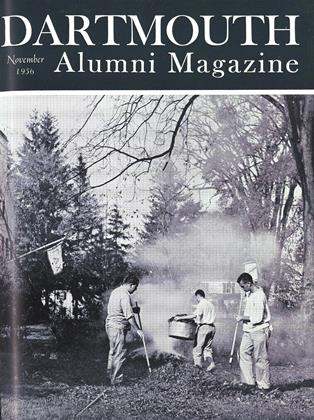ONE of the surest evidences that the College has once again settled down to the main business of learning is the steady influx of educators and national and international experts to meet with classes or give public lectures.
One of the first visitors of the new college year was Albert Ewert, Taylorian Professor of Romance Languages and Fellow of Trinity College, Oxford, who lectured and also met with Dartmouth's Romance Languages faculty. Another speaker from England was Sir Arnold Lunn, who discussed British literary figures he has known. India's Ambassador to the United States, Gaganvihari L. Mehta, came to Hanover as the principal speaker at the Northern New England Historians Conference.
Pennington Haile '24 opened the Tower Room talks October 9 with a discussion of the Suez crisis, and in succeeding days visiting speakers included Prof. W. Critz George of the University of North Carolina, who defended segregation in the public schools; William B. Kelly of the U. S. State Department, who discussed the Foreign Service; Prof. Lorrin Riggs, Brown University psychologist; Dean Eugene S. Wilson of Amherst, who spoke to the freshman class on studying in college; New Hampshire State Senator Edward J. Bennett, who was guest of the Young Republicans; the Rev. Mounir Sa'adah of Woodstock, Vt., whose lecture topic was "The Cult of Mediocrity"; and, on October 23, the British historian, Dr. William M. Jordan, assistant director of the Political Affairs Division of the United Nations, whose lecture on "The United Nations and the Crises of Our Time" was the feature event of Dartmouth's observance of United Nations Day.
The first Union Service of the year was held in Rollins Chapel on Sunday, October 21, with the Rev. Samuel H. Miller of the Old Cambridge (Mass.) Baptist Church as guest preacher.
The Great Issues course, entering upon its tenth year, had its own string of visiting lecturers, beginning early in October. The distinguished speakers included Charles A. Siepmann, Professor of Education at New York University; Robert L. Heilbroner, economist and author; Sir William Haley, editor of The Times of London; Norris Cotton (R), U. S. Senator from New Hampshire; and Jonathan Bingham (D), secretary to Governor Averell Harriman of New York.
A great deal more than lectures was on the College calendar last month. Nearly all the campus organizations were getting under way with public meetings, foreign films were shown, poetry readings were held, the Navy Band gave two concerts in Webster Hall, Duke Ellington and his orchestra performed before a sell-out crowd in Webster, and the calendar even included a public "hoot" in Cutter Hall, which, for the uninitiated, can be defined as an informal gathering of instrumentalists and singers interested in folk music.
 View Full Issue
View Full Issue
More From This Issue
-
 Feature
FeatureThe Poet as Teacher The Poet as Teacher
November 1956 By RICHARD EBERHART '26 -
 Feature
FeatureThe Convocation Address
November 1956 -
 Feature
FeatureFinancial Report for 1955-56
November 1956 -
 Feature
FeatureClub Officers Hold Conference
November 1956 -
 Class Notes
Class Notes1926
November 1956 By HERBERT H. HARWOOD, H. DONALD NORSTRAND, RICHARD M. NICHOLS -
 Class Notes
Class Notes1918
November 1956 By ERNEST H. EARLEY, W. CURTIS GLOVER, RICHARD P. WHITE
Article
-
 Article
ArticleTo Head Wheaton
June 1944 -
 Article
Article'58 Alumni Fund : $455,301
OCTOBER 1958 -
 Article
ArticleTHE SPIRIT OF '21
December 1941 By George L. Frost -
 Article
ArticleTuck School
January 1950 By H. L. Duncombe, Jr. -
 Article
ArticleGREEN JOTTINGS
JUNE 1972 By JACK DEGANGE -
 Article
Article"I Give and Bequeath to the Trustees of Dartmouth College ..."
January 1947 By STANLEY B. JONES '18


